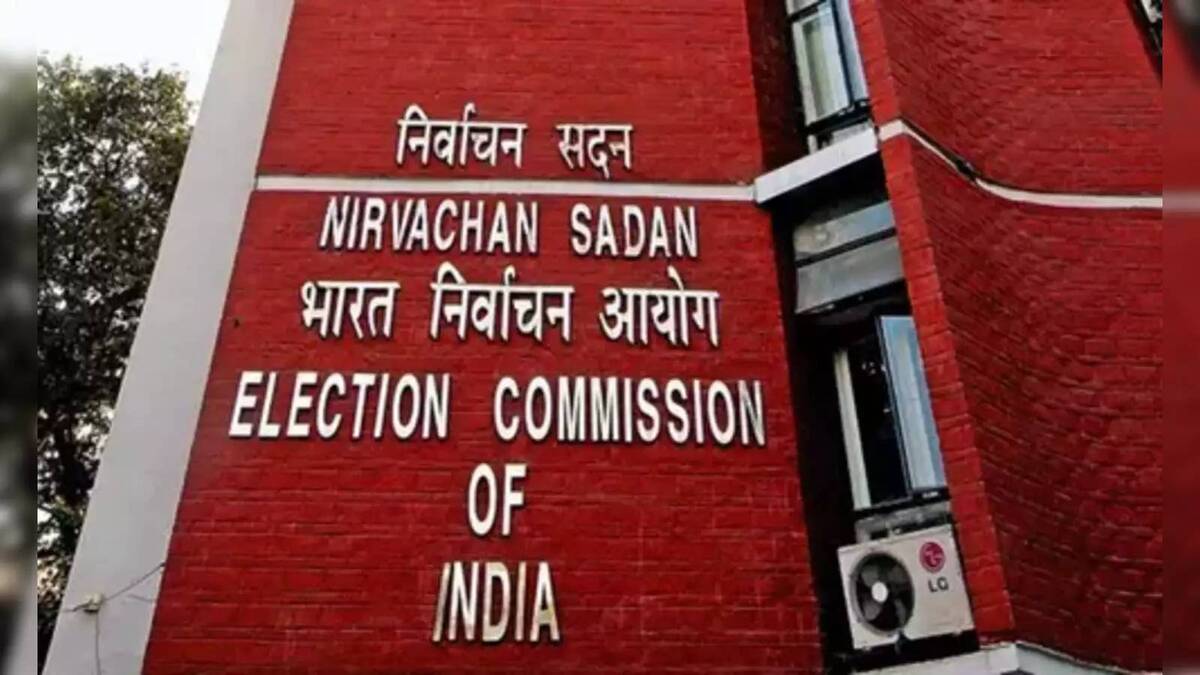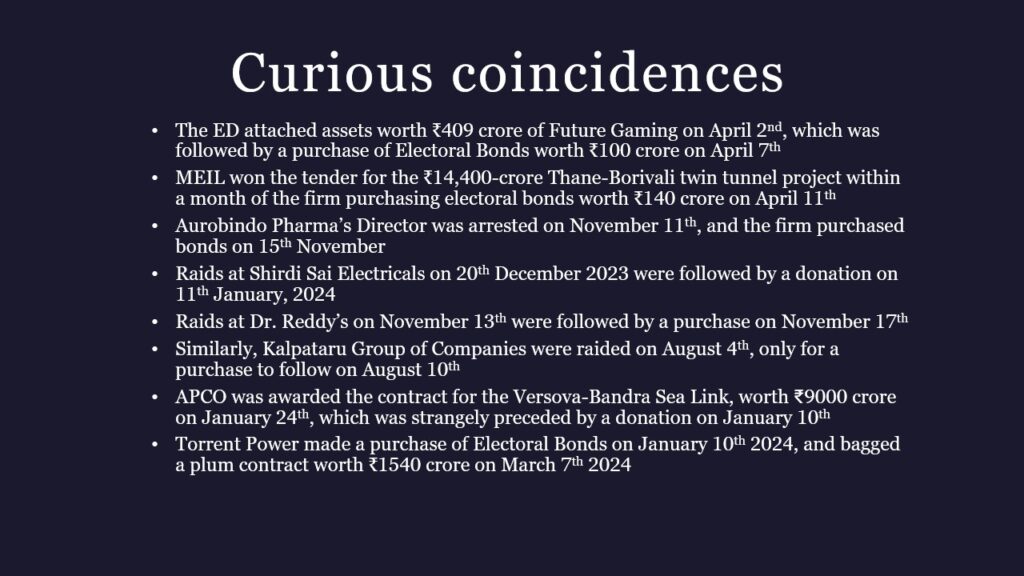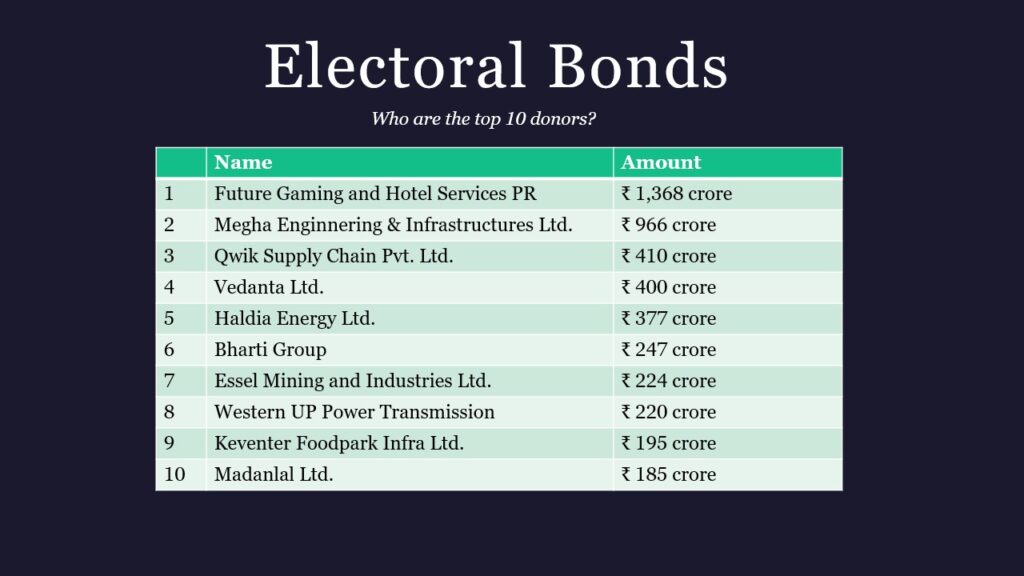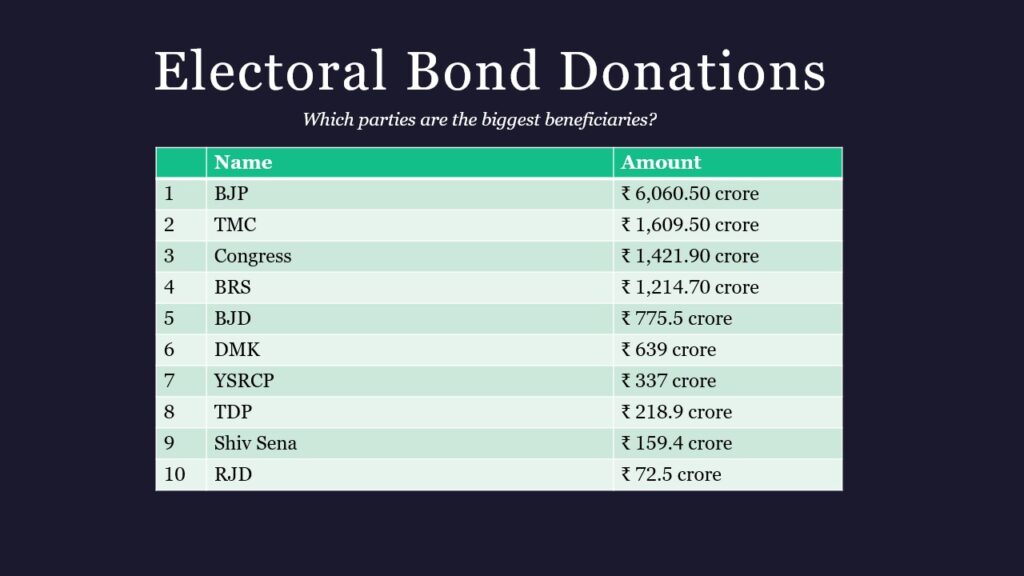Explainer
Decoded: The Biggest Beneficiaries and Patrons of Electoral Bonds
Published
2 years agoon

After the Supreme Court scrapped the seven-year-old Electoral Bond system funding system that allows individuals and companies to donate money to political parties anonymously and without any limits, there has been much speculation and analysis around these bonds, which were called “unconstitutional” by the Supreme Court in a ruling.
What are Electoral Bonds?
Introduced in 2017 by the Narendra Modi government, the Electoral Bonds scheme allowed for any amount of donation to a political party of your choice while maintaining anonymity.
The system was challenged by opposition members and civil society groups since it significantly hindered the public’s right to know who had given money to political parties. While individuals could donate any amount of cash, companies had been restricted based on their revenue and profits. This bond system removed those limits.
While doing away with the system, a five-judge bench headed by Chief Justice D.Y. Chandrachud noted that, “Political contributions give a seat at the table to the contributor… this access also translates into influence over policy making…because of the close nexus between money and politics, it is possible that financial contributions would lead to quid pro quo arrangements.”
In saying so, the court directed the State Bank of India (SBI) to reveal the full list of donors and amounts to the Electoral Commission by March 12, while SBI asked for time till June 30th (effectively after the elections), saying it needed time to match the buyers of the bonds with the political parties that encashed it. The court struck this down, and SBI shared this data on March 14th, which showed that 23 companies accounted for half the total value of bonds purchased since April 2019. However, SBI stopped short of indicating who each donor donated to.
Why does it matter?
It is important to shed light on the Electoral Bonds, since its opaqueness can have devastating effects down the road. The opacity of the electoral bonds strike at the very heart of democracy, and its introduction has been criticised in many quarters for its potential to aid corruption thanks to its legalisation of undisclosed, unlimited corporate donations to political parties.
What do the numbers say?
Indian political parties collected $1.99 billion dollars worth of near-anonymous donations from 2017 to November 2023, and the Bharati Janata Party (BJP) was the biggest beneficiary of these electoral bonds. The party garnered 55% of bonds from March 2018 to March 2023, and 90% of corporate donations in 2023.
All said, the BJP received some ₹61 billion ($732 million) through electoral bonds, over quadruple the Congress Party’s ₹14 billion ($171 million) between April 2019 and January 2024, as per Bloomberg reports.
It is worth that Electoral bonds worth over ₹2,500 crore were sold from March 2018 to March 2019, and SBI hasn’t shared the data of that period.
Who were the big buyers?
The top lottery company in India, Future Gaming and Hotel Services, made the largest purchase of ₹1368 crore. Other significant buyers of bonds were Bharti Airtel, Vedanta mining company, Megha Engineering infrastructure conglomerate, Sun Pharma, PVR, Maruti and Suzuki car manufacturers, Cipla pharmaceutical company, and Bharti Enterprises.
Notably absent from the list were India’s richest men, Mukesh Ambani and Gautam Adani, who may still have contributed through other entities, or whose contributions could have been part of those worth over ₹2,500 crore sold from March 2018 to March 2019 that SBI did not disclose.
Who are some of the lesser-known companies?
This is where things get murky and striking coincidences start to emerge among 3 of the 5 biggest donors on the list. Let’s start with the biggest donor on the list, Future Gaming and Hotel Services.
Future Gaming and Hotel Services
The organisation, led by Santiago Martin, purchased bonds worth ₹1,368 crore during the time period of October 2020 to January of this year. As stated on their website, they are the top contender in India’s lottery market, with a revenue of more than $2 billion, and have operations in Tamil Nadu, Kerala, Karnataka, and Northeast India.
They have been the subject of scrutiny from various agencies, including the Central Bureau of Investigation (CBI), the Enforcement Directorate (ED), and the Income Tax department, for several years. The CBI investigated multiple cases concerning Sikkim lotteries in 2011.
Remarkably, a report by Reporters Collective reveals that in the financial year 2020-21, Future Gaming and Hotel Services Private Limited demonstrated admirable generosity of spirit, donating ₹150 crore through electoral bonds, despite reporting a profit before tax of only ₹84.79 crore.
It is alleged that Martin and his associates gained illicit profits of ₹910 crore between April 2009 and August 2010 by deceiving the state government. In 2019, the ED initiated a money laundering investigation against Future Gaming and Martin based on seven charge sheets filed by the CBI in the Sikkim lottery case. In May of 2023, the ED conducted new raids against Martin and has so far seized assets worth ₹457 crore.
However, it is a curious coincidence that the ED attached assets worth ₹409 crore of the company on April 2nd, which was followed by a purchase of Electoral Bonds worth ₹100 crore on April 7th.
This is a pattern that was to be repeated.
Megha Engineering and Qwik Supply Chain
MEIL, a Hyderabad-based company, ranks second among the top donors to political parties. It has purchased bonds worth ₹966 crore in recent years.
The company, led by Krishna Reddy, is responsible for major projects of the Telangana government, including the prestigious Kaleswaram Dam project. It is also involved in the construction of the Zojila tunnel and the Polavaram dam.
Notably, there are numerous allegations of mismanagement and corruption against Megha Engineering. These accusations are significant and include:
- Disproportionately increasing costs in the Kaleswaram project, Telangana
- Charging Tamil Nadu power corp. ₹16 per unit for its thermal project, which some have called excessive
- Critically, they were behind a hostile takeover of TV9, which included jailing of journalists.
Nevertheless, MEIL won the tender for the ₹14,400-crore Thane-Borivali twin tunnel project, beating out goliaths like L&T. Significantly, this came within a month of the firm purchasing electoral bonds worth ₹140 crore on April 11, 2023.
Qwik Supply Chain
Qwik Supply Chain Pvt. Ltd. is another company that catches the eye. Having donated ₹410 crore via the bond system, a curious pattern of generosity emerges.
As per the Reporters Collective, the company gave away ₹360 crore to political parties in the financial year 2021-22. In the same year, its net profit was a humble ₹21.72 crores. And yet, in the financial year 2023-24, the company made donations of another ₹50 crore.
A preliminary look at the financial records of the company shows it has links to the Reliance Group. As a subsidiary company, it supplies fuel to Jio petrol pumps exclusively, and the Reliance connection deepens, when one sees that Tapas Mitra, a Director in the company, is the Head of Accounts at Reliance.
If you’re still not convinced about the Reliance connection, he is also Director at partnership firms such as Reliance Eros Productions LLP and companies such as Jamnagar Kandla Pipeline Company Private Limited.
Of course, there is nothing insidious about this. But it does bring the Reliance connection to light, somewhat.

A pattern among donations
But speaking of patterns, here are some intriguing ones.
- Aurobindo Pharma’s Director was arrested on November 11th 2022, and the firm purchased bonds on 15th November 2022
- Raids at Shirdi Sai Electricals on 20th December 2023 were followed by a donation on 11th January, 2024
- Raids at Dr. Reddy’s on November 13th were followed by a purchase on November 17th
- Similarly, Kalpataru Group of Companies were raided on August 4th, only for a purchase to follow on August 10th
- There’s more. APCO was awarded the contract for the Versova-Bandra Sea Link, worth ₹9000 crore on January 24th, which was strangely preceded by a donation on January 10th
- Torrent Power made a purchase of Electoral Bonds on January 10th 2024, and bagged a plum contract worth ₹1540 crore on March 7th 2024
It’s not just companies either…
Another name that catches the eye in the data shared is that of Rithwik Projects Pvt. Ltd., owned by politician CM Ramesh, which acquired bonds worth ₹45 crore. In October 2018, the IT department conducted a search at properties linked to the company amid claims of funds being diverted to the tune of ₹100 crore.
After a few months, Ramesh, until then a TDP MP, switched to the BJP. Make of that what you will.
The entire saga of the Electoral Bonds is one that strikes at the heart of democracy. Goodness thrives in the light, while the devil is said to frolic in the dark. With the Supreme Court shedding some light on the darkest corners of the Electoral Bonds and shutting the system down, there is still hope of transparency and keeping the powerful accountable. In fact, just today, the SBI’s knuckles were rapped for sharing incomplete data, and the Supreme Court has now ordered for electoral bond numbers to be published. This will reveal the link between donors and political parties, and is further cause for hope that greater transparency will prevail in the politico-corporate nexus.


You may like
-


Flipkart appoints Digbijay Mishra as new VP of Corporate Communications
-


Heavy hitting England face-off with India in Mumbai Semifinal
-


Fans roast Karan Aujla’s Mumbai concert
-


India’s Logistics Ambition on Full Display at Transport Logistic India and Air Cargo India 2026
-


Report: Mojtaba Khamenei named new Supreme Leader of Iran
-


Who is Ayatollah Alireza Arafi, Iran’s interim Supreme leader?


